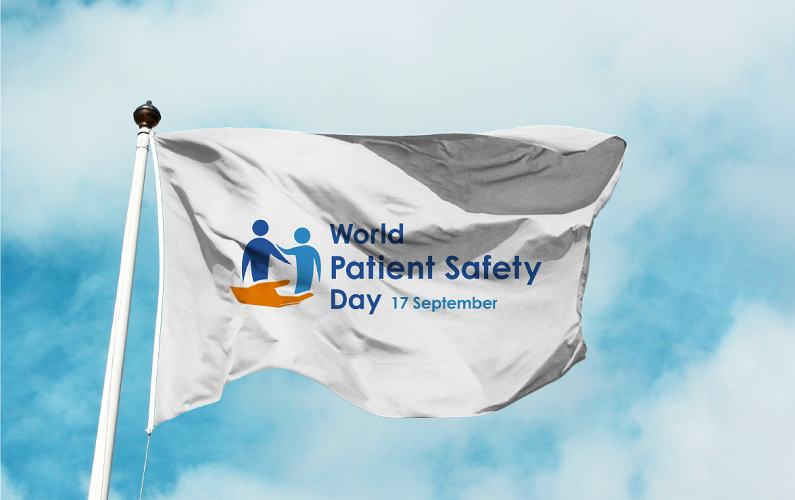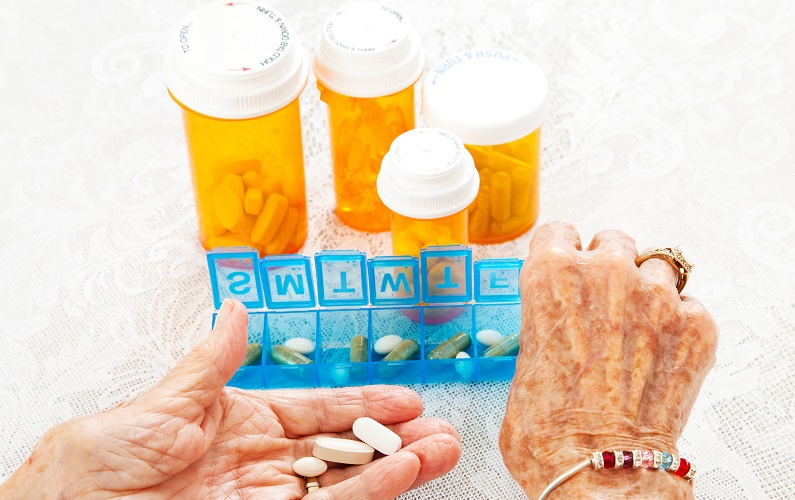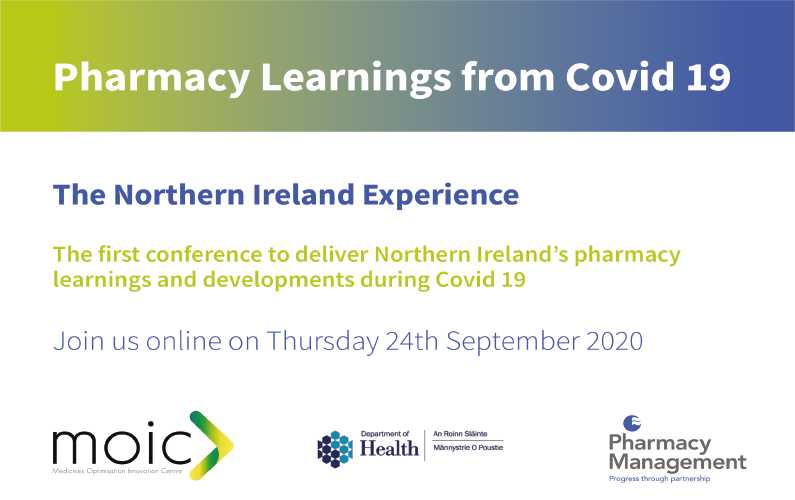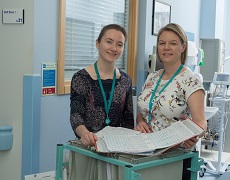
by Edel O'Sullivan, | Sep 17, 2020 | News Release, Press, Uncategorized
It’s World Patient Safety Day and it is a day to highlight that patient safety is at the forefront of everything we do.
MOIC is the only dedicated medicines optimisation centre in Europe and we work across Europe to improve medicines use, leading to better patient care. We provide research, project management and offer professional expertise on projects that will improve patient safety through correct medicines use. We engage with partners across Europe and throughout the world on best practice and bring his learning back to Northern Ireland.
Today on World Patient Safety Day, take a look at some of our recent publications, the first examines how medicine optimisation clinics can reduce hospital readmission and the second looks at critical care drug use in ICU during Covid. Both these projects had patient safety as the key driver.
Medicine Optimisation reducing Hospital re-admission
This work looked at how educating patients on their medicine use through dedicated clinics could lead to fewer hospital patients.
https://themoic.hscni.net/medicine-optimisation-reducing-hospital-readmission/
Results
- Readmission rate reduction at 30 days was 9.6%
- Reduction in multiple readmissions over 180-days was 29.1%
Critical Care Drug Requirements
https://themoic.hscni.net/critical-care-drug-requirements-during-covid-19/
The main aim of this work was to develop a process to estimate critical care drug requirements to robustly inform regional procurement planning and preparedness in response to the COVID-19 pandemic. The objectives were to identify critical care drugs required, obtain patient usage data and consider current regional practice to establish the requirement.

by Edel O'Sullivan, | Sep 9, 2020 | News Release, Press
There is a major drive within healthcare to reduce patient readmissions to hospital. MOIC has led research on how a medicines optimisation clinic can change readmission to hospital rates and lead to better patient care.
The research focused on assessing the impact of a post-discharge, pharmacist-led medicines optimisation clinic on readmission within the respiratory and cardiology wards
Adult patients with acute unplanned admission to medical wards were invited to attend clinic to review their medicines and educate patients on proper use of their medicines.
Results
- Readmission rate reduction at 30 days was 9.6%
- Reduction in multiple readmissions over 180-days was 29.1%
A positive impact was also demonstrated in relation to patient beliefs about their medicines and medication adherence.
Anita Hogg Northern Health and Social Trust
“Having delivered the medicines optimisation clinic and supported patients in the safe and effective use of their medicines, I’m delighted that this paper has been published, reinforcing the benefits of a dedicated medicines optimisation clinic to patient care after discharge from hospital”
The post-discharge medicines optimisation clinic was beneficial from a patient care and cost perspective.
Full paper can be found here.

by Edel O'Sullivan, | Sep 4, 2020 | Events
MOIC alongside Pharmacy Management (www.pharman.co.uk ) hosted the first conference to view learning and further development of pharmacy best practice as a result of COVID-19.
The conference delivered online attracted a very significant audience.
The programme supported by the DOH in Northern Ireland displayed outstanding examples of patient care improvements through pharmacy.
As a worldwide “first” the conference brought together the profession and other healthcare professionals and showed substantiated examples of how pharmacy adapted to manage the pandemic and the benefits that will now be incorporated in to current practice.

by Edel O'Sullivan, | Jul 29, 2020 | News Release, Press
The critical care drug requirements paper by MOIC has now been published in EJHP and can be accessed via this link:
http://ejhp.bmj.com/cgi/rapidpdf/ejhpharm-2020-002368
The main aim of this work was to develop a process to estimate critical care drug requirements to robustly inform regional procurement planning and preparedness in response to the COVID-19 pandemic. The objectives were to identify critical care drugs required, obtain patient usage data and consider current regional practice to establish the requirement.
Assuring the availability of critical medicines at the point of need during a pandemic is particularly complex. The balance between ‘normal’ supply and demand is eroded as demand escalates and organisations may order excess stock to maintain continuity of supply, placing further pressure on already constrained medicines and the supply chain.
A collaborative approach to planning is required, between manufacturers, wholesalers/suppliers, health departments, Trusts and medicines procurement specialists. A key component of this is to estimate critical drug requirements to meet demand, both currently and for the anticipated surge.
As a result of this work a regional database was constructed and used to produce a model for calculating approximate critical drug requirements. The model was used to map critical drug requirements to available stock in Trusts and wholesalers/suppliers, enabling the identification of treatment capacity for these medicines regionally, both currently and for projected surges. Data have also been used in the preparation of weekly regional situation reports for onward reporting to the HSC Board and the Department of Health.
Cathy Harrison, Chief Pharmaceutical Officer at the Department of Health, commenting ‘I very much welcome the development of the supply and demand model for critical care medicines and I support its use for managing and monitoring other groups of essential medicines and healthcare supplies at risk of potential shortages. The model provided essential information and assurance during the response to COVID-19 and I commend all those involved in its development’.
Pharmaceutical interventions and medicines optimisation are essential components of the healthcare response to COVID-19. Medicines are a clinical priority and are required to support both patients and front-line clinical staff in their efforts to deal with the virus and to optimise patient care. As a result, there has been an unprecedented global demand on supportive medicines, particularly in critical care.
Interview with Anita Hogg

by Edel O'Sullivan, | Dec 12, 2019 | News Release, Press
MOIC recently were involved in evaluating a post discharge pharmacy follow up service in Northern Trust.
Patients taking lots of medication are at a higher risk of medication related problems such as interactions and adverse effects. This is a particular issue after admission to hospital as often there are several new or changes to medicines. During the 2018/19 year, the results from a post-discharge from hospital follow-up study were fully analysed by MOIC with assistance from researchers at Queen’s University Belfast.
In the study, patients (n=211) discharged from hospital on multiple medications were followed up by a clinical pharmacist by telephone at 5, 30 and 90 days post-discharge. The results indicated that those receiving such telephone calls had a:
- 9.9% reduction in 30 day readmission rates.
- 15.2% reduction in 90 day readmission rates.
- Positive health economic benefit, with return in investment at £51 per £1 spent at 30 days.
- High level patient satisfaction.
Following the positive results observed, funding was applied for under the Northern Ireland Transformation Funding programme and this was awarded during 2019 to roll this initiative out as a service in Antrim Area Hospital.
Since the roll out in September 2019 feedback from patients has been extremely positive. 73% of patients said they felt more confident about their medications after the calls and 82% said they would recommend it to a friend.
The below quotes are from patients that have received the telephone discharge service.
“Brilliant service as you are so weak and low and it helps to have a real person in contact with you so you can ask and clarify questions.”
“I really appreciated the follow-up after my discharge from hospital. I know how busy my local doctors are….. I don’t know how long you offered this service after discharge but personally I was glad of it, so thank you.”
“Really thought it was a great idea. Felt somebody cared.”
“Pharmacist very helpful. Nice to have a follow up and help from the discharge team after a stay in hospital.





